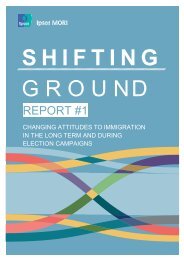You also want an ePaper? Increase the reach of your titles
YUMPU automatically turns print PDFs into web optimized ePapers that Google loves.
Ties <strong>that</strong> Bind<br />
17 Stolen Valour: How the forces<br />
of extremism and racism are<br />
hijacking the good name of<br />
Britain’s military, and what needs<br />
to be done to stop them, edited<br />
by James Bethell. See: www.<br />
nothing british.com/Stolen<br />
Valour.pdf<br />
18 Ibid.<br />
19 http://www.wewerethere.<br />
defencedynamics.mod.uk/ww1/b<br />
ackground_ww1.html<br />
10 | policyexchange.org.uk<br />
Armoured Brigade (Desert Rats) in the first Gulf War, went some way towards<br />
addressing this. 17 Their letter called on the BNP to ‘cease and desist’ from<br />
hijacking ‘the good name of Britain’s military’. It continued:<br />
Commonwealth soldiers, who comprise about 10% of the Services, represent an invaluable<br />
contribution to the success of Britain’s military, both in history and the current day. Many have<br />
won the highest awards. 18<br />
Figure 1: Do you think the following statement applies: ‘Muslims<br />
living in this country are loyal to this country’?<br />
100%<br />
90%<br />
80%<br />
70%<br />
60%<br />
50%<br />
40%<br />
30%<br />
20%<br />
10%<br />
0%<br />
36<br />
49<br />
15<br />
Bri�sh public Bri�sh Muslims<br />
Don’t know/refused Does not apply Applies<br />
Popularising the record of Muslim servicemen who fought for Britain in the First<br />
and Second World Wars is one of the ways the armed forces can undermine the<br />
canards of the BNP – while reconnecting with British Muslims and encouraging<br />
them to consider military careers.<br />
It is a remarkable fact <strong>that</strong> hundreds of thousands of Muslims volunteered to<br />
fight for Britain during the First and SecondWorldWars. In 1914 they even fought<br />
the ostensible Muslim power of the day – the Ottoman Empire – with whom it<br />
was feared their loyal<strong>ties</strong> might lie.Why did they choose to fight for Britain? What<br />
motivated them? And how did they reconcile the competing demands on their<br />
loyalty – between a King who required their services, and an Ottoman Sultan<br />
who, as Caliph, demanded their loyalty as the successor to the Prophet<br />
Mohammed and leader of the Muslim community?<br />
Of course, it was not just Muslims who volunteered. During the Great War, over<br />
one million men from across the Commonwealth enlisted for the British war effort<br />
from territories as far and wide as the British West Indies to Egypt; from the Indian<br />
subcontinent to Mauritius, Fiji and China. 19 Hindus, Sikhs and others from within<br />
the Indian Empire played their own particular distinguished parts in this record of<br />
service. But their role in the service of the Crown is not contested today, either<br />
from within or without their own communi<strong>ties</strong>, in the same way as is <strong>that</strong> of<br />
Muslims.That is why a renewed focus on what really happened to Muslims in past<br />
conflicts holds so much of the key to their future participation in our national life.<br />
The effect of 9/<strong>11</strong> on Muslim identity in the West has been acute, causing<br />
many to regard the relationship between their creed and country as being in<br />
82<br />
6<br />
12



